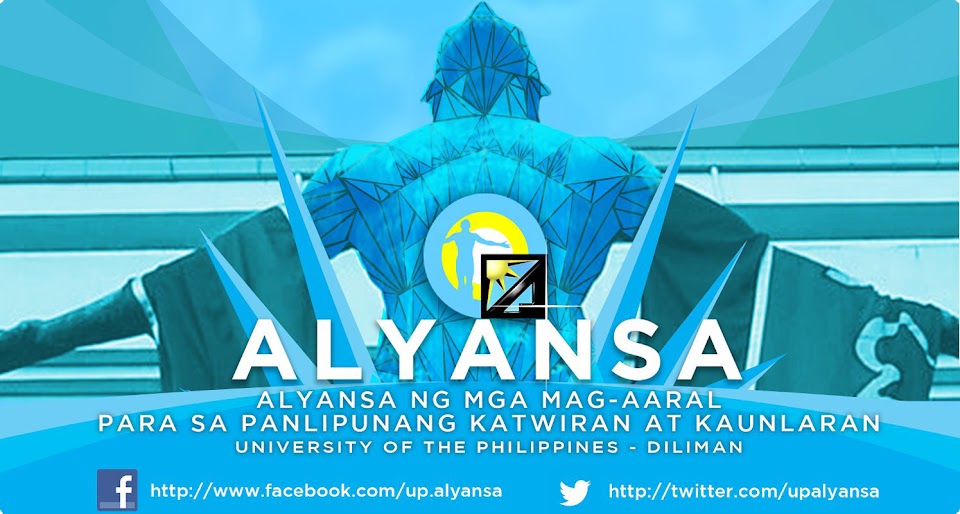We greet the new academic year mourning. As we pay our tuition fees, the scene becomes all too clear: One of us, unable to pay, is forced to take a loan from the University, forced to sit through classes without her name in the class list, and eventually forced to leave the University due to financial incapacity.
At the height of our frustration, it becomes easy to unqualifiedly oppose. The danger arises, however, when we decide to do away with policies and programs that are otherwise reasonable in principle. What will happen to UP students without socialized tuition? Will we all be forced to pay equally high tuition rates? Is free tuition possible without sacrificing quality education, given the current budget deficiency for state universities and colleges?
In the context of wide social inequality and scarcity in the budget for higher education, a socialized tuition scheme in its essence presents itself as the most viable solution to ensure that our education is at the same time quality and accessible. Reality demands equity over equality: Those who cannot pay must be subsidized, while those who can must pay.
Yet, despite its idealism, the present tuition scheme as revised in 2007 is unjust, regressive, and flawed. While the "no late payment" policy in UP Manila has been suspended, we continue to be haunted by anti-student rules such as Art. 330 of the University Code, unjustly stating without qualification that "no student who has not duly matriculated shall be admitted to classes." The rule is aggravated by the administration's imposition of unjust ad hoc policies such as assigning students to Bracket B by default.
Moreover, present tuition rates as percentage of income are larger for lower brackets, producing a regressive tuition schedule.* Whereas Bracket A students pay only at most 0.15% of their income for tuition, Bracket B students pay at most 0.20%, Bracket C students pay 0.24%, and Bracket D students pay 0.22%.
Finally, flaws in the implementation of the STFAP are all too familiar: Because of the current policy of centralizing bracket processing in the System-wide University Committee on Scholarships and Financial Assistance (UCSFA) that rarely meets every academic year, results of STFAP applications never make it in time for enrollment. At the same time, arbitrary and outdated indicators based solely on income have produced countless overheard stories of mismatches in bracket assignment.
All of these problems make it clear that, despite our momentary victory in making tuition loanable for up to 100%, the struggle for a just, progressive, and efficient socialized tuition scheme must continue.
The outdated STFAP and other student financial services must be reformed by:
- Repealing the "no pay, no admission" rule in Art. 330 of the University Code;
- Developing a progressive tuition schedule by either increasing income thresholds per bracket or lowering tuition fees;
- Allowing payment of tuition in installments or a late payment option;
- Prohibiting default bracket assignments;
- Reducing the time for bracket processing to 2 months and releasing results before enrollment;
- Decentralizing approval of bracket appeals to the unit/campus level;
- Using consumption-based indices instead of the current income-based index;
- Making bracket assignments transparent by providing detailed explanations upon release of STFAP results;
- Ensuring flexibility through midyear bracket reassignment in cases of unexpected changes in income sources per family;
- Applying the STFAP even for graduate and second-degree students without increasing tuition rates;
- Allowing online STFAP application and submission of electronic documents, as recognized under the E-Commerce Law;
- Providing transportation allowance upon entry of freshmen from distant areas; and
- Annually reviewing existing tuition policies and programs.
The unheard cry of one of us, along with our frustration, must now be coupled with serious, concrete, and critical proposals for reform. Our struggle has been long, complex, and painful, but our victories prove that history is now in our hands.
As the Board of Regents is set to once again discuss the University's tuition scheme on June 20, we will make sure we are heard. On June 19, join us at the AS Steps, 4:00pm, for a mass tarp signing for our proposed reforms. The tarp will be posted in campus to welcome regents arriving the next day.
Iskolar para sa Bayan, ating pagtagumpayan ang isang makatarungan, progresibo, at epektibong programang pangmatrikula sa Unibersidad!
Be critical. Go beyond scrap.
REFORM THE STFAP NOW!


